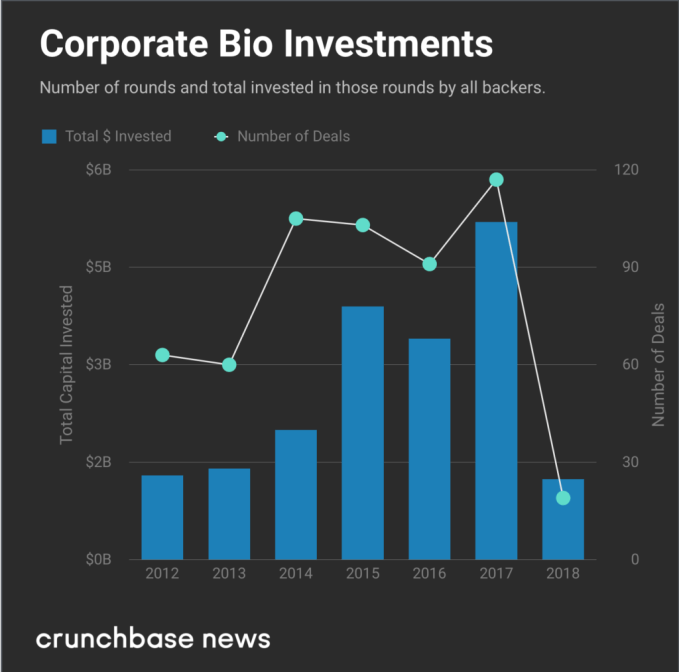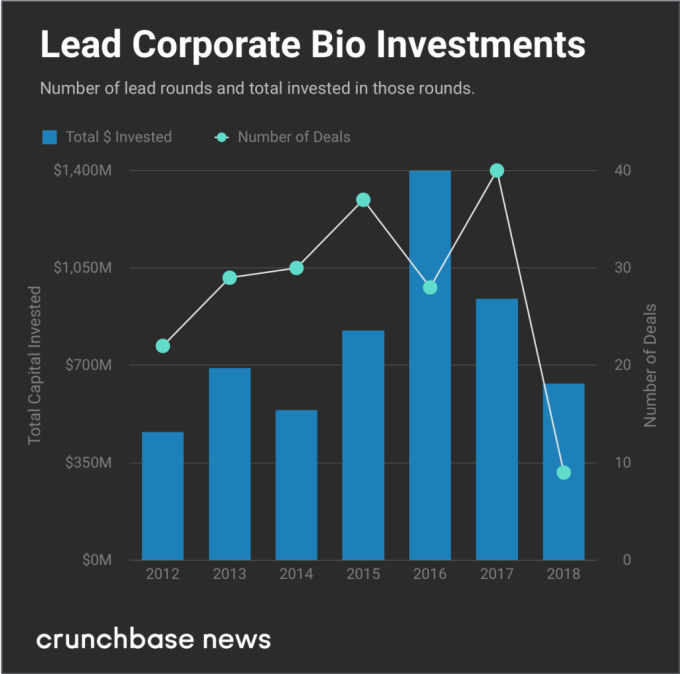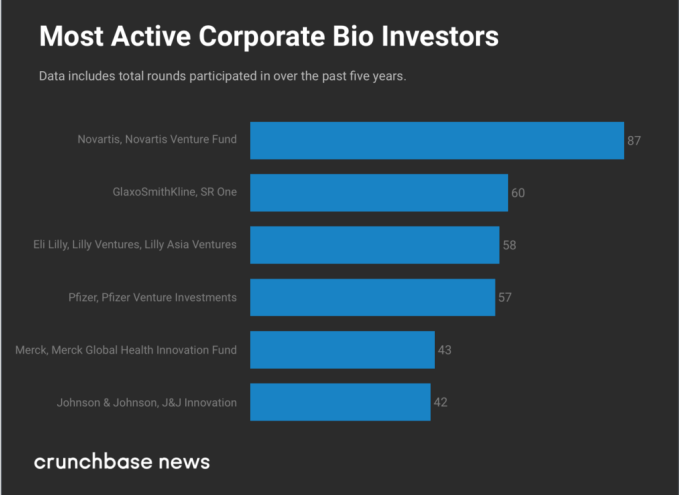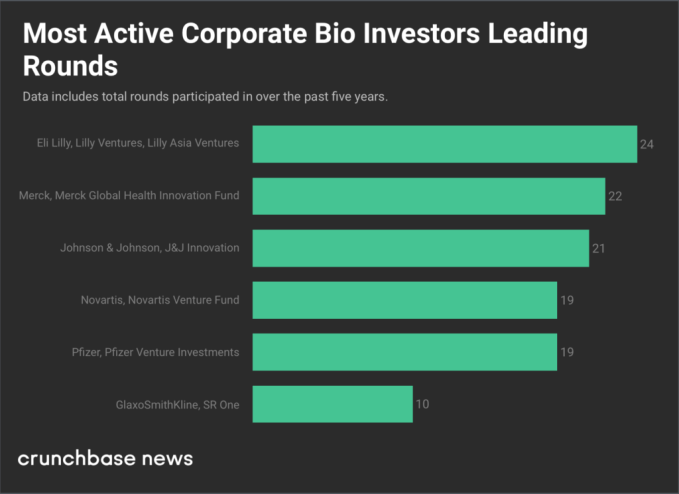Biotech is a lot like venture capital. Vast amounts of research, testing and marketing go into a wide range of therapies. But in the end, it’s just a tiny fraction that deliver most returns.
That similarity may be why most of the biggest biotech and pharmaceutical companies have a long history of engaging in the venture business as startup investors, spin-out creators and strategic partners. Since last year, the largest corporate players participated in funding rounds valued at more than $6.4 billion, according to Crunchbase data. Trendlines also show investment is on the rise.
In an effort to measure the size, scope and growth trajectory of this startup funding space, Crunchbase News assembled a few data sets of the largest corporate venture investors in biotech. We culled through the largest companies by market cap and short-listed 19 with a history of active funding, often through dedicated venture arms.
Looking at these corporate investors in aggregate, we found that deal count hit the highest point in a decade in 2017. Average round sizes are also getting bigger, so it looks like corporate bio VCs are putting more capital to work, too. Following are some of our findings in more detail.
Round counts are up, and they’re getting bigger
The size of the average round has been getting bigger across the entire venture industry. So it’s not surprising that corporate bio investors are following suit.
Last year, the VCs on our shortlist participated in 117 funding rounds valued at $5.2 billion altogether. That works out to an average of $44 million per round — by far the highest average in the past five calendar years.
But round sizes may still have higher to go. So far, 2018 is off to an expensive start, with average round size of more than $60 million, thanks to recent funding rounds over $200 million for Celularity, in the placental stem cell space, and Helix, a provider of personal genome analysis.
Below, we look at the number of rounds per year with a short-listed corporate bio investor, along with the total invested in those rounds by all backers.

Corporate bio VCs are leading more rounds, too
It’s difficult to tell how much a single backer put into a round when there’s a big syndicate of co-investors. That’s why we also looked specifically at deals with a corporate bio VC as lead investor, as it indicates a large stake.
Over the past five calendar years, the most active corporate bio investors have collectively lead between 28 and 40 rounds annually, with the highest total in 2017. However, the total amount of capital going into rounds with a corporate bio VC as lead investor hit a multi-year high in 2016, with about $1.4 billion invested.
In the chart below, we look at lead rounds over the past five calendar years, as well as the first couple months of 2018:

A few really large rounds move the needle on investment totals. This year, for example, $250 million of the total came from a single deal: a Celgene-led investment in the aforementioned Celularity, a spin-out focused on placental stem cell-based therapies. Last year, $150 million of the total came from a single round led by Biogen for immunotherapy developer Neurimmune.
Who’s most active
As one might expect, the most active corporate venture investors in biotech and pharma are all among the most highly valued public companies in the space. Not only do these companies have deep pockets, they are also under constant pressure from shareholders to develop and commercialize breakthrough therapies. While it’s possible to do this in-house, major players realize it’s also necessary to have some skin in the startup space.
In the chart below, we look at the most active corporate bio investors of the past five years. The bulk of their dealmaking comes from dedicated venture funds, most of which have been around for years.

Who’s pulling ahead?
Several corporate VCs have become increasingly active in recent quarters.
Celgene, in particular, stands out. The Summit, New Jersey-based pharma giant is under pressure to expand its pipeline, given that more than half its revenue is currently generated by a single product, the chemotherapy drug Revlimid.
In response, Celgene has spent copiously on acquisitions and VC deals. This year, it announced planned purchases of venture-backed drug developer Impact Biomedicines in a deal valued at up to $7 billion, and publicly traded cancer immunotherapy developer Juno Therapeutics for $9 billion. As for venture deals, beside backing Celularity last month, Celgene also just led a $100 million financing for drug developer Vividion Therapeutics.
Johnson & Johnson and Abbvie have also been investing at a stepped-up pace in the past few quarters, Crunchbase data indicates.
Onward to exits
Offsetting the risk to some degree for corporate bio VCs is the fairly strong IPO market for promising biotech startups. Over the past four months, healthcare IPOs actually outnumber tech company debuts on U.S. exchanges.
And if an IPO isn’t in the cards, there is always the option of buying the companies themselves or allowing a rival to snap them up.

